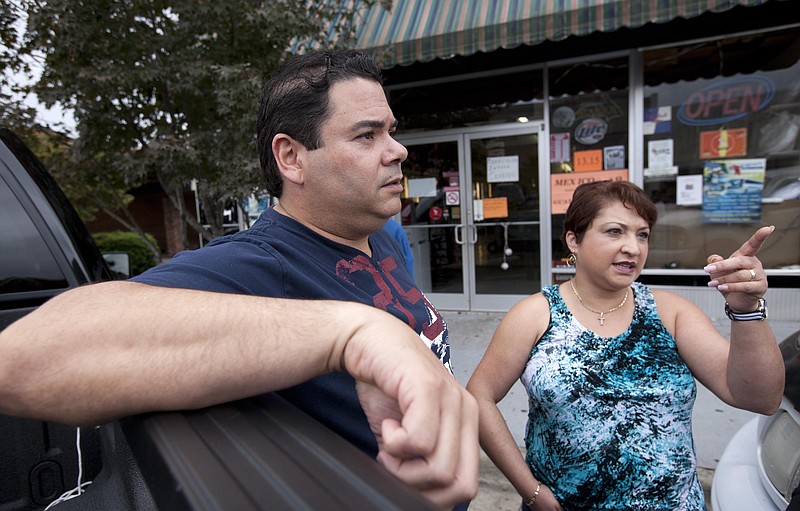JAY REEVES, Associated Press
ALBERTVILLE, Ala. - Along Main Street in this small Alabama town, the Mexican restaurant was closed, lights were out at a Hispanic-owned grocery store and even a bank catering to Spanish speakers was dark. Nearby, the usual hum of a chicken processing plant was silent.
Businesses dependent on immigrant labor were shuttered Wednesday as workers took the day off to protest the state's strict new immigration law.
The work stoppage appeared largest in northeast Alabama, the hub of the state's $2.7 billion poultry industry, but metropolitan areas were also affected. At least a half-dozen chicken processing plants closed or scaled back operations because employees, many of whom are Hispanic, didn't show up for work or told managers in advance they wanted to join the sick-out to show disapproval of the law upheld by a federal judge two weeks ago.
"We want the mayor, the governor, this judge to know we are part of the economy of Alabama," said Mexican immigrant Mireya Bonilla, who manages the supermarket La Orquidea, or "The Orchid," in Albertville.
The town of about 19,000 people has one of the highest concentrations of Hispanics in the state. Out of 4.7 million people in Alabama, there are an estimated 185,000 Hispanics, most of them of Mexican origin.
It wasn't clear exactly how many workers participated in the protest, but the parking lot was virtually empty at a Wayne Farms poultry plant, which employs about 850 people in Albertville. All along Main Street, Hispanic businesses were closed.
Jose Contreras shut down his restaurant and store, a move he said cost him about $2,500.
"We closed because we need to open the eyes of the people who are operating this state," said Contreras, originally from the Dominican Republican and a U.S. citizen. "It's an example of if the law pushes too much what will happen."
Since the law was upheld, many frightened Hispanics have hid in their homes or fled. Some construction workers, roofers and field hands have stopped showing up and schools have reported high absentee rates among Hispanic students. Officials said even more students were absent Wednesday, apparently because of the protest.
The Obama administration has asked the 11th U.S. Circuit Court of Appeals to at least temporarily block enforcement of the law, arguing in court documents Wednesday that the statute oversteps the state's authority and could lead to the discrimination of legal residents. The appeals court has not indicated when it may rule on the administration's request for a preliminary injunction.
The law allows police to detain people indefinitely if they are suspected of being in the country illegally and requires schools to check the status of new students when they enroll.
Republican supporters say the new immigration law, considered the toughest in the nation, was intended to force illegal workers out of jobs and help legal residents find work in a state suffering from high unemployment. GOP Gov. Robert Bentley, who signed the law, had no immediate comment on the protests.
Spanish-speaking radio stations and Facebook users helped spread the word about the sick-out.
At Crossville Elementary School in DeKalb County in the northeast part of the state, principal Ed Burke said about 160 of the school's 600 students weren't in class.
"We normally would have about 20 or 30 out," he said.
A few miles away, a Hispanic-owned grocery store was closed. Morning business was slow at a convenience store typically full of Hispanic workers buying breakfast.
"There's nobody. We're usually wide open," said a store worker who would not give her name.
Albertville Mayor Lindsey Lyons said the protest wouldn't hurt the city very much, even though dozens of businesses were closed.
"It will only be a minor impact. Most of our major retailers are open," Lyons said.
Although on a smaller scale, the Alabama protest was similar to one in 2006, when hundreds of thousands of people demonstrated at numerous events around the nation to beat back a bill in Congress that aimed to stiffen penalties for illegal immigration. Thousands of California students walked out of classes that March, among numerous protests that led up to a "Day Without Immigrants" worker boycott.
